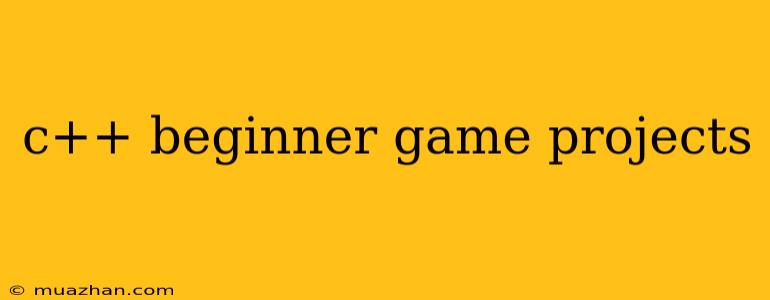C++ Beginner Game Projects: Start Your Coding Journey
Are you a beginner in C++ and looking for exciting projects to hone your skills? Building games is a great way to learn programming concepts in a fun and engaging manner. Here are some beginner-friendly C++ game projects that will get you started:
1. Number Guessing Game
This classic game is a perfect introduction to basic C++ concepts like:
- Input and Output: Taking user input and displaying output on the screen.
- Random Number Generation: Using the
rand()function to generate random numbers. - Loops and Conditionals: Using
forloops andifstatements to control the game flow.
Game Logic:
- Generate a random number between a specified range.
- Ask the user to guess the number.
- Provide feedback on whether the guess is too high, too low, or correct.
- Repeat steps 2 and 3 until the user guesses the correct number.
2. Simple Text-Based Adventure Game
This project will introduce you to:
- Arrays and Strings: Using arrays to store game data like story elements, characters, and options.
- Functions: Writing functions to organize code and make it reusable.
- Conditional Statements: Using
if-elsestatements to control the game's storyline based on user choices.
Game Logic:
- Create a simple story with multiple paths based on player choices.
- Use arrays to store story elements, descriptions, and available options.
- Implement functions for displaying text, handling user input, and advancing the story based on choices.
- Use
if-elsestatements to navigate the different paths based on the player's selections.
3. Tic-Tac-Toe
This popular game is ideal for learning:
- Arrays: Using two-dimensional arrays to represent the game board.
- Functions: Writing functions to check for a win condition, make moves, and display the board.
- Loops: Using
forloops to iterate through the board and check for winning combinations.
Game Logic:
- Create a 3x3 array to represent the game board.
- Implement functions to display the board, take player moves, check for a win condition (rows, columns, diagonals), and handle ties.
- Use
forloops to iterate through the board and check for winning combinations.
4. Snake Game
This classic arcade game will introduce you to:
- Object-Oriented Programming (OOP): Using classes to represent the snake, food, and game board.
- Game Loop: Implementing a loop to update the game state, handle user input, and draw the game elements.
- Collision Detection: Using conditional statements to detect collisions between the snake and food or the boundaries of the game board.
Game Logic:
- Create classes for Snake, Food, and GameBoard.
- Implement the game loop to update the snake's position, check for collisions, and draw the game elements.
- Use conditional statements to handle collisions and determine the game's outcome (win or lose).
5. Simple Puzzle Game
This project can involve various game mechanics, like:
- Data Structures: Using data structures like stacks, queues, or linked lists to manage game elements.
- Graphics: Learning basic graphics programming with libraries like SFML or SDL to create visual representations of the game elements.
- Algorithms: Implementing algorithms to solve puzzles or generate game levels.
Game Logic:
- Choose a simple puzzle concept like sliding tile puzzles, match-3, or word puzzles.
- Implement logic for moving game elements, checking for valid moves, and determining the game's winning condition.
- Use graphics libraries to visualize the game elements and create an interactive user interface.
These are just a few examples of beginner-friendly C++ game projects. As you progress through these projects, you'll gain a strong foundation in C++ programming concepts and develop valuable skills for creating more complex games in the future. Remember, the key is to start small, break down projects into manageable steps, and don't be afraid to experiment and have fun!
